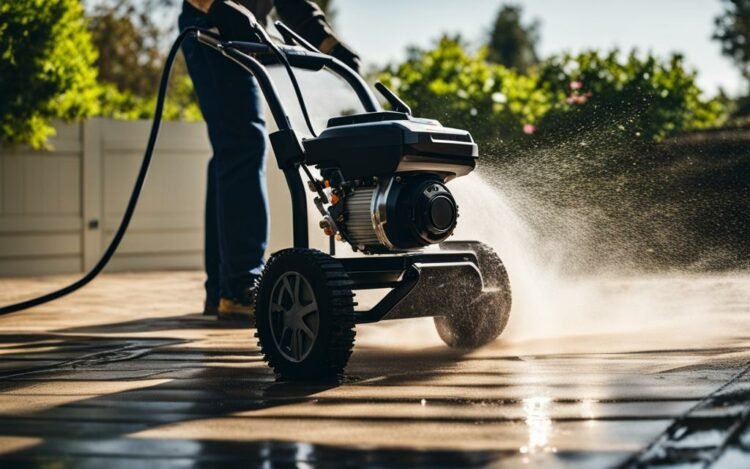Pressure washers are powerful cleaning tools that can tackle tough stains and heavy-duty jobs. If you’re considering purchasing an electric pressure washer, there are several important factors to take into account. This buying guide will help you make an informed decision and choose the right electric pressure washer for your needs.
When shopping for an electric pressure washer, there are a few key considerations to keep in mind. First, pay attention to the PSI (pound per square inch) rating, which indicates the cleaning force of the water. The higher the PSI, the more powerful the pressure washer will be. Next, consider the GPM (gallon per minute) flow rate, as this determines how much water the pressure washer can deliver. Lastly, look at the cleaning units (CU), which provide a measure of the cleaning speed.
Another important factor is the type of pressure washer you need. Electric pressure washers are an excellent choice for most household cleaning tasks. They are generally quieter, more eco-friendly, and have easy on/off switches. However, gas pressure washers offer more power and mobility, making them suitable for heavy-duty and professional use.
Lastly, don’t forget to choose the right nozzle for your pressure washer. Different nozzle types produce different spray patterns and pressures, so selecting the appropriate nozzle for the task at hand is crucial for achieving the desired cleaning results.
Key Takeaways:
- Consider the PSI rating, GPM flow rate, and cleaning units (CU) when purchasing an electric pressure washer.
- Choose between electric and gas pressure washers based on your cleaning needs and power preferences.
- Select the right nozzle for the task to achieve optimal cleaning results.
- Electric pressure washers are quieter, more environmentally friendly, and have easy on/off switches.
- Gas pressure washers offer more power and mobility, making them suitable for heavy-duty tasks.
Understanding How Pressure Washers Work
Pressure washers are powerful cleaning tools that operate by using a motorized pump to generate high-pressure water flow. The performance of a pressure washer is determined by its PSI (pounds per square inch) rating, which refers to the force of the water on the surface being cleaned, and its GPM (gallons per minute) flow rate, which measures the volume of water delivered per minute. These two factors, along with the cleaning units (CU) measurement, define the cleaning speed of a pressure washer.
When you turn on a pressure washer, water flows from the source into the pump, where it is pressurized for increased force. Then, the pressurized water is delivered through a concentrating nozzle, which directs a high-powered stream onto the targeted surface. The nozzle’s design determines the width and angle of the spray pattern, allowing for more precise cleaning.
It’s important to choose a pressure washer with the appropriate PSI rating for the task at hand. Using too high of a PSI on delicate surfaces can cause damage, while using too low of a PSI may not achieve the desired cleaning results. Similarly, the GPM flow rate affects the speed and efficiency of the cleaning process. By understanding how pressure washers work and considering the PSI, GPM, and CU, you can select the right electric pressure washer for your specific cleaning needs.
Along with the PSI, GPM, and CU, it’s also essential to consider the different categories of pressure washers available, such as light duty, medium duty, heavy duty, and industrial duty. Each category offers a specific range of PSI and is suitable for different types of cleaning tasks. By understanding these key terms and categories, you can make an informed decision when choosing an electric pressure washer.
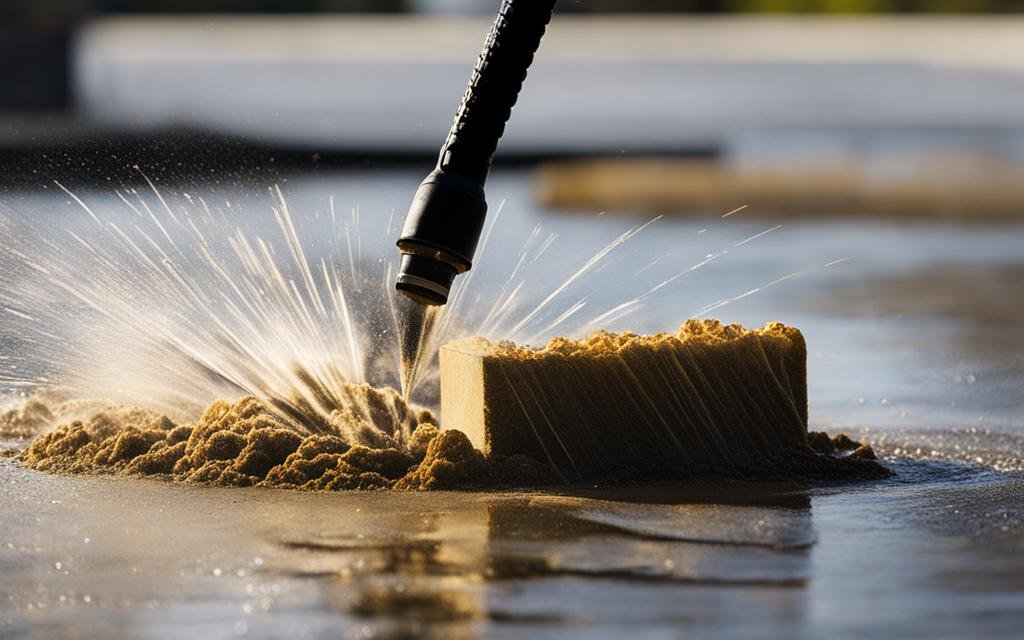
Key Points:
- Pressure washers use a motorized pump to create high-pressure water flow.
- PSI measures the force of the water, while GPM measures the volume delivered per minute.
- Understanding PSI, GPM, and CU is crucial for selecting the right electric pressure washer.
- Choose a pressure washer with an appropriate PSI rating for the specific cleaning task.
- Consider the different categories of pressure washers based on your cleaning needs.
Different Types of Electric Pressure Washers
When it comes to electric pressure washers, there are several different types to choose from. Each type has its own unique features and benefits, allowing you to find the perfect one for your specific cleaning needs.
Gas Pressure Washers
Gas pressure washers are known for their power and mobility. They are ideal for heavy-duty cleaning tasks that require a high level of pressure. With a gas pressure washer, you can easily tackle tough stains and large surface areas. However, it’s important to note that gas pressure washers tend to be louder and produce more emissions than electric models.
Electric Pressure Washers
Electric pressure washers are a popular choice for their quieter operation and eco-friendly design. They typically have an on/off switch, making them easy to use. Electric pressure washers are available in various styles, including cart, carry, handheld, stationary, skid, and wall mount, allowing you to find the right one for your cleaning needs.
Cordless Pressure Washers
If you’re looking for even greater portability, cordless pressure washers are the way to go. These pressure washers are powered by batteries, giving you the freedom to clean anywhere without the need for a power outlet. Cordless pressure washers are lightweight and easy to maneuver, making them perfect for smaller cleaning tasks.
Water Brooms and Surface Cleaners
For specific cleaning applications, water brooms and surface cleaners are available as pressure washer accessories. Water brooms are designed for cleaning large, flat surfaces such as driveways, decks, and patios. Surface cleaners, on the other hand, are ideal for cleaning tiled or concrete surfaces. These accessories help enhance the cleaning efficiency and ensure a thorough clean.
Steam Cleaners
Steam cleaners are another type of electric pressure washer that uses hot steam instead of high-pressure water. They are perfect for sanitizing and deep cleaning hard surfaces without the need for chemicals. Steam cleaners are effective at removing grease, grime, and bacteria, making them a great choice for indoor cleaning tasks.
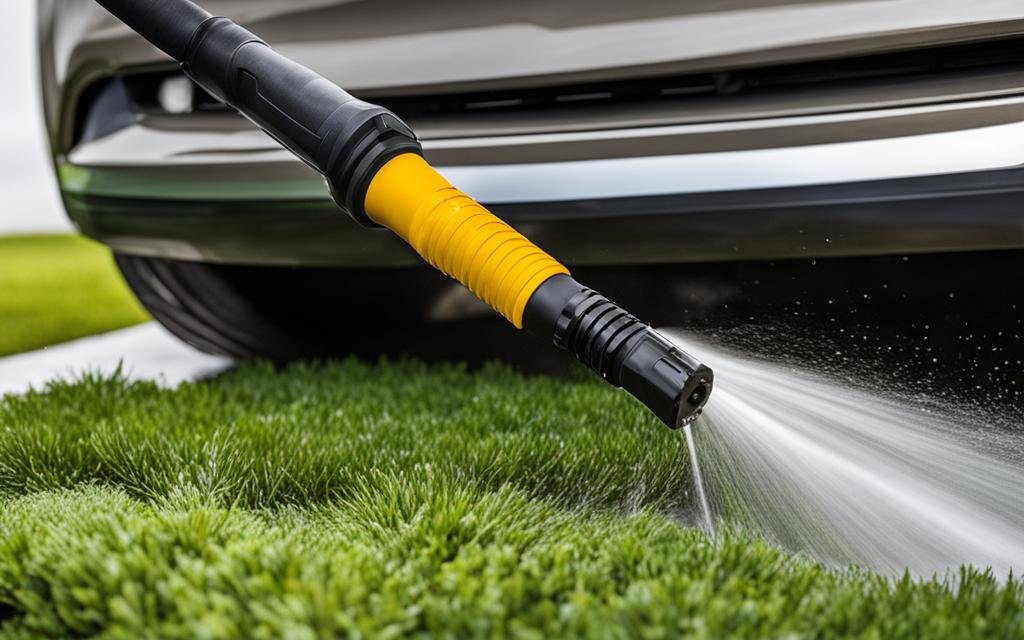
With the variety of electric pressure washers available, you can find the perfect one to meet your cleaning needs. Whether you opt for a gas or electric model, cordless pressure washer, or specific accessories like water brooms and surface cleaners, there is a solution for every cleaning task. Consider the type of cleaning you’ll be doing and the level of portability you require to make the right choice.
Choosing the Right Pressure Washer Nozzle
When it comes to getting the best cleaning results with your electric pressure washer, choosing the right nozzle is key. Pressure washer nozzles come in various colors and angles, each designed for specific cleaning tasks. By understanding the different nozzle options available, you can ensure efficient and effective cleaning for a variety of surfaces.
Nozzle Colors
Pressure washer nozzles are often color-coded to indicate their spray patterns. The most common colors include:
- Red: The zero-degree nozzle creates a highly concentrated, powerful stream of water, ideal for heavy-duty cleaning and removing tough stains.
- Yellow: The 15-degree nozzle provides a narrow spray pattern and is suitable for intense cleaning of moderate to heavy-duty surfaces.
- Green: The 25-degree nozzle offers a wider spray pattern, making it ideal for general light-duty cleaning tasks.
- White: The 40-degree nozzle produces an even wider spray pattern, making it suitable for more delicate surfaces that can be easily damaged.
- Black: The 65-degree nozzle creates a wide and gentle spray pattern, perfect for applying detergent or rinsing large areas.
By selecting the appropriate color-coded nozzle, you can achieve the desired cleaning results while minimizing the risk of damage to your surfaces.
Understanding Cleaning Power: PSI and GPM
When it comes to electric pressure washers, understanding the cleaning power they offer is essential. The cleaning power is determined by two key factors: PSI (pounds per square inch) and GPM (gallons per minute). The PSI measures the pressure or cleaning force of the water, while the GPM measures the volume of water delivered per minute. Together, these ratings determine how effectively and efficiently the pressure washer can tackle different cleaning tasks.
The PSI rating is crucial as it indicates the force of the water on the surface being cleaned. A higher PSI means a stronger cleaning force, making it ideal for tough stains and heavy-duty jobs. On the other hand, a lower PSI is suitable for lighter tasks that require a gentler touch. The GPM rating, on the other hand, indicates how much water the pressure washer can deliver in a minute. A higher GPM means a greater volume of water, which can help cover larger areas more quickly.
To determine the appropriate cleaning power for your needs, it’s important to consider both the PSI and GPM ratings. A PSI chart can be a helpful tool in determining the right pressure washer for a specific job. The chart provides guidelines based on the task at hand, whether it’s light-duty, heavy-duty, or requires tough industrial cleaning. By understanding the PSI and GPM ratings, you can choose an electric pressure washer that delivers the optimal cleaning power for your cleaning needs.
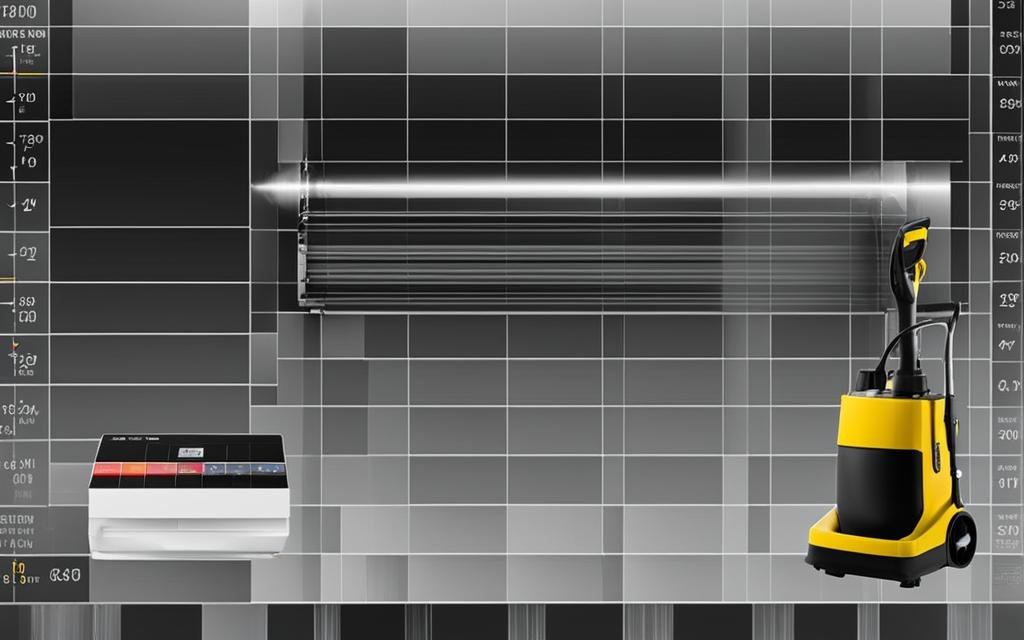
Essential Pressure Washer Accessories
When it comes to maximizing the cleaning power of your electric pressure washer, having the right accessories is key. With the right tools at your disposal, you can tackle a wide range of cleaning projects with ease. Here are some essential pressure washer accessories to consider:
Nozzles
Nozzles are an important accessory for achieving different spray patterns and pressures. They come in various degrees, including 0-degree, 15-degree, 25-degree, 40-degree, and even 65-degree options. Each nozzle is designed for specific cleaning tasks, whether it’s removing tough stains or gently rinsing delicate surfaces.
Brushes
Brush attachments are great for scrubbing away dirt and grime from surfaces like decks, driveways, and siding. They come in different materials, including nylon and bristle, allowing you to choose the best option based on the surface you’re cleaning. Rotating brushes are particularly useful for more stubborn stains.
Tips and Extension Wands
Tips and extension wands are accessories that help you reach higher areas and clean hard-to-reach spots. Extension wands provide extra reach, allowing you to clean second-story windows or gutters without the need for ladders. Tips, on the other hand, provide additional versatility by allowing you to adjust the spray angle and intensity.
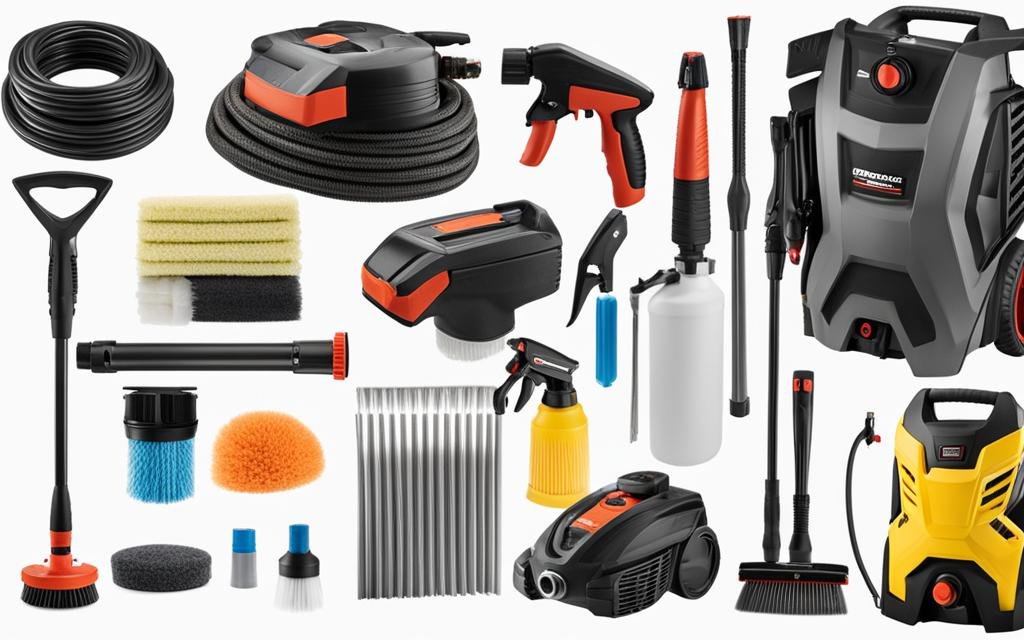
By having these essential pressure washer accessories in your arsenal, you can take your cleaning capabilities to the next level. Whether you’re tackling a large outdoor project or simply giving your patio furniture a refresh, these accessories will help you achieve the best results.
Conclusion
In conclusion, when purchasing an electric pressure washer, there are several important factors to consider. These include the PSI rating, GPM flow rate, and cleaning units. Understanding how pressure washers work and the different types available, such as gas and electric models, will help you make an informed decision.
Choosing the right pressure washer nozzle is essential for achieving optimal cleaning results. Each nozzle, ranging from zero-degree to 65-degree, serves a specific purpose and should be selected based on the task at hand. Additionally, understanding the cleaning power of a pressure washer, measured by the PSI and GPM ratings, will ensure effective and efficient cleaning.
Finally, investing in essential pressure washer accessories, such as different nozzles, brushes, and extension wands, can greatly enhance your cleaning experience. By considering these factors and following the guidelines provided, you can confidently select the best electric pressure washer for your needs and achieve outstanding cleaning results.

